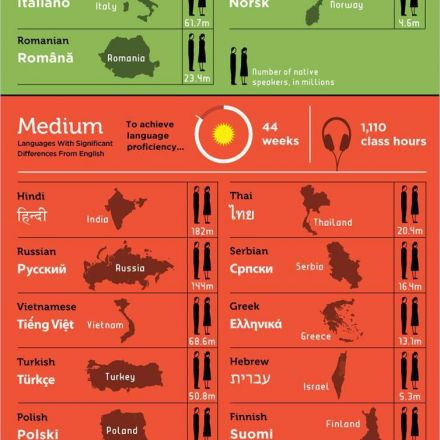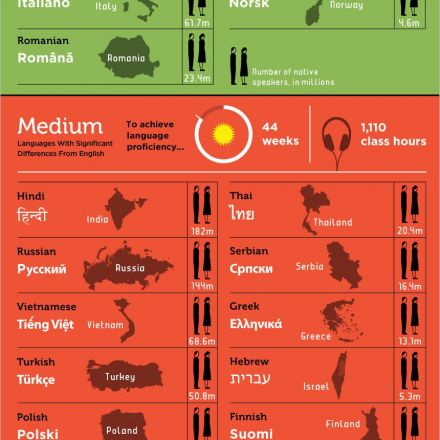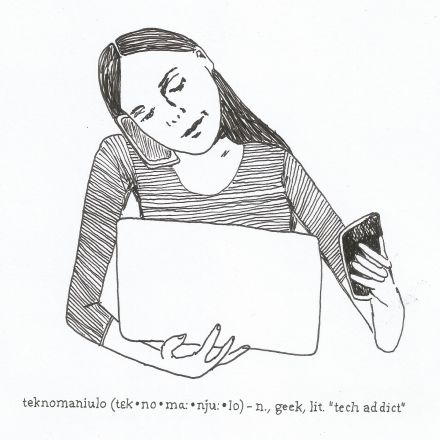

10 years ago
4
An Infographic Showing the Most Difficult Languages to Learn as a Native English Speaker.
Created using data from the Foreign Service Institute of the US Department of State, based on the average time it takes a native speaker to gain reading/speaking proficiency.
Continue Reading


























Join the Discussion
Having a bit of experience and second hand experience with a brother teaching overseas, the basic breakdown for Chine, Japanese, and Korean is generally as follows:
- Chinese has tones and tons of characters. If you can hear the tones, speaking it isn't that hard from my experience. The grammar is relatively similar to English, in that it follows the Subject/Verb/Object format, which makes it easier to get started. Afterwards, it's just learning the newer syntax for some of the sentence structure, and that doesn't take too much time to learn. As for writing... Lots and lots of repetition. They learn the characters by sitting down and writing them over and over and over again, which between that and flashcards, is the easiest way to learn the characters to read the language.
- Japanese is relatively easy to start out with, given that it has an alphabet system. Well... Two, actually. The sounds are very similar to what we use in English overall, but get some nuances that you have to take a lot more time learning and are often time really subtle (The difference between saying pants and panties in Japanese is dependent on how you say the last vowel in the words, for example.) The grammar is all backasswards in comparison to English, following a Subject/Object/Verb syntax, which anyone who's taken French or Spanish will have some experience with. For me, the grammar was the hardest part when I studied it briefly before, which ended up leading me to Chinese instead. And let's not get started on honorific forms and whatnot.
- Korean is very, very different from English. Whereas in Japanese you have a sound system that's very similar to English, and Chinese you have a grammar system that nearly mirrors English in many cases, in Korean you have neither of those. Like Japanese it's S/O/V, and they make frequent use of sounds that are never used in English, which further complicates trying to learn it when you don't have anything to compare it to. While it isn't a tonal language, the unfamiliar sounds that are hard for a native English speaker to pronounce will be a tripping point for a lot of people.
Hope someone out there finds these tidbits useful!
I learned Mandarin and Korean, and I agree with you on these, for the most part.
For Mandarin, it depends where you are, but if you're in a big city with Chinese people from all over the country, they'll probably be more tolerant to not knowing the tones. In Shanghai, for instance, you can speak "tone-deaf" Mandarin and people will mostly understand from context. This is ideal, because you can just focus on learning the language until your ear "clicks" on tones. For me, it took about a month, but then something in my brain clicked and I could suddenly understand the tones. It adds a sort of "musicality" to the words, and we have equivalent things in English (such as stress syllable) so it's not that hard.
Otherwise, yes, Mandarin has a really simple grammar, so that part isn't hard. And if you "give up" writing and just focus on communication skills, I'd say the hardest part of Mandarin is vocabulary words that sound very different from English (obviously).
For Korean, Korean's blessing is its simple alphabet. You can learn it quickly and it's hard to forget. The grammar, however, is pretty insane. What I found the hardest, though, is how Koreans use specific "sentences" to say, for instance, thank you... So it's a lot harder to memorize than Mandarin, for instance.
I found Korean easier to pronounce than Mandarin, that's for sure. Mandarin has some funky sounds... Like the "r" that's in-between a r and a j. That one's fun!
I've learned Mandarin and Spanish up to intermediate, and I've learned bits and pieces of Korean, Thai, and Bulgarian... And yeah, language learning difficulty is very real. I was shocked the first time I was in Mexico that I spoke better Spanish after 6 weeks than I did Mandarin after a year...
That being said, what I find is the biggest hurdle to learning a language is immersive context. If you're in a situation where you're exposed to "comprehensible input" in a consistent manner, and you're motivated to learn and use your new skills, then you will learn. If, however, the place you're at is accommodating to non-speakers, the tendency to rely on English will win out.
As an example, I lived a few months in a non-touristy part of Thailand (Issan) where I really needed Thai just to order at the restaurant. So I learned the (really hard) alphabet and (equally hard) language up to a functional level. Then I moved to Chiang Mai, which has plenty of tourists and thus plenty of Thais who speak English, and I lost most of it. It was embarrassing.
Some people can get by with discipline instead of being forced to speak their target language. I spent a month in Spain and forced myself to communicate only in Spanish, even if the people I met knew English or French (the two other languages I knew better back then). I even deliberately chose touristic information in Spanish instead of the two other, including audio guides and stuff. The funny thing is, I have no idea how easier it would have been with English and/or French, since I didn't even ask if people spoke other languages than Spanish!
But I agree that people without discipline should jump in the water and go to a place they simply can't rely on their native language.